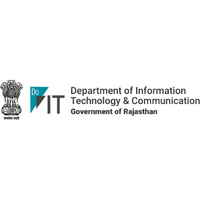
Government Of Rajasthan
View Brand PublisherRajasthan announces new startup policy at Jodhpur DigiFest aimed at scaling and diversifying the state’s startup ecosystem
Launched on November 13, 2022 by Chief Minister Ashok Gehlot, Rajasthan Startup Policy 2022 will lend a hand to early and growth stage startups in the state.
The Rajasthan government has announced a brand new policy for startups and entrepreneurs in the state, the Rajasthan Startup Policy 2022.
The policy was officially launched by Rajasthan Chief Minister Ashok Gehlot at the second edition of the Rajasthan DigiFest 2022 in Jodhpur, as part of the Department of Information Technology and Communication’s three-day youth and entrepreneurship summit from November 11-13, 2022.
The policy aims to promote Rajasthan as a hub for innovation and boost startup growth across industry verticals such as agriculture, education, healthcare, and fintech; increase job opportunities for and upskill youth; and encourage diversity and sustainability within the startup ecosystem.
In a statement online, Chief Minister Gehlot said, “Information technology has played an important role in sensitive, transparent and accountable good governance. The state government is using IT to take the benefits of its schemes to the last person. [The Rajasthan Startup Policy 2022] will encourage startups in the state, employment opportunities will increase, and investment sector will also expand. In this, special care has been taken for every category including SC-STs [Scheduled Castes and Scheduled Tribes].”
The new policy builds on the older startup policy that was implemented in 2015, increasing incentives for startups and broadening its scope. The base funding amount for all startups registered to the government’s iStart Rajasthan program has doubled from Rs 1.2 lakh to Rs 2.4 lakh, with an extra Rs 60,000 given to startups with women founders who have more than 50 percent equity in the company.
A number of other funding incentives are also available for startups depending on their QRate, a rating system for startups recognised by iStart based on their potential and investment worthiness. Depending on their rating, startups can apply for the Viability Grant set aside for seed-stage startups. This can go up to Rs 60 lakh for companies rated Bronze and higher; a Scale Up Fund worth up to Rs 2 crore for Gold rated companies and above. There are also Boosters for the Viability Grant for startups that meet certain diversity and employment criteria; and other additional financial incentives.
The iStart Techno Fund matching fund scheme has also increased its maximum limit from Rs 25 lakh to Rs 2 crore, for startups that meet prerequisite criteria.
The Rajasthan Startup Policy 2022 has clearly defined roles and responsibilities for all stakeholders within the startup ecosystem. This includes enabling a number of outreach and training programs for the startups, such as gaining access to courses at the Rajiv Gandhi Centre for Advanced Technology, Rajasthan Institute of Advanced Learning, and the upcoming Rajiv Gandhi Fintech Digital Institute; outreach and awareness for startups through exposure visits and networking events such as expos, demo days, and startup meets; and facilitating meetings with mentors, investors and others.
Startups will also benefit from policy and government related projects, which includes receiving work orders valued up to Rs. 15 lakh without going through the tender process, and a special category for startups for procurement of goods and services under the Rajasthan Transparency in Public Procurement Act 2012. The Rajasthan Investment Promotion Scheme also gives startups the opportunity to avail tax benefits and reimbursements, such as an Investment Subsidy of 75% of state taxes due and deposited for seven years, and 100% exemption of electricity duty, mandi fee, and land taxes for seven years.
Student entrepreneurs can also avail benefits such as being recognised by iStart under the School Startup Program, while university students with startup ideas can avail a gap year to work on the startup as well as convert it into their final year project, depending on university approval.







